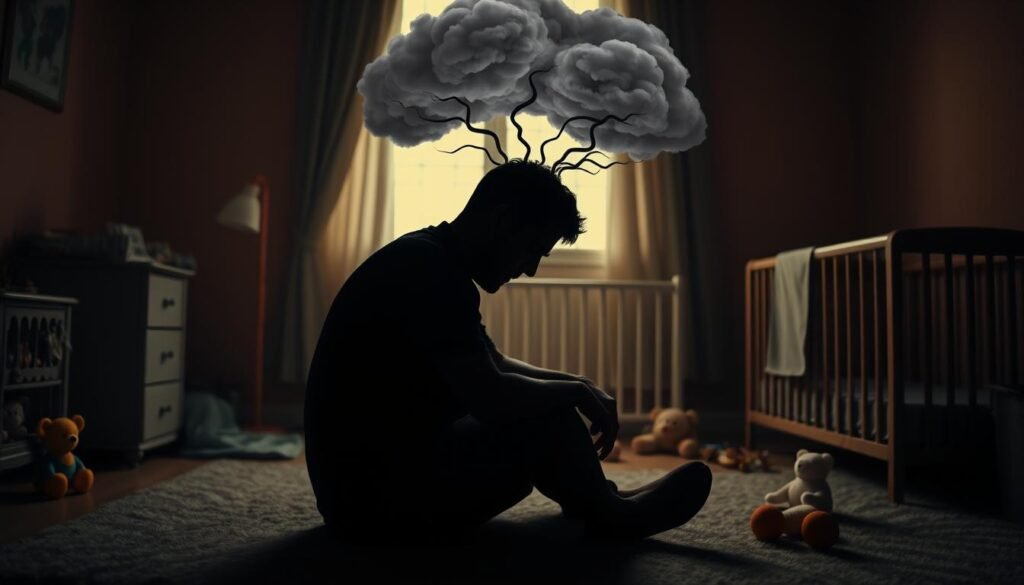Can Men Get Postpartum Depression? Postpartum depression is often linked to new mothers. But, research shows that men can also get it. It’s important to know this to support them.
Fathers need to understand that they can get postpartum depression. This can affect their mental health and relationships. It’s key to recognize the signs and get help.
It’s important to recognize postpartum depression in men. By doing so, we can support and help them. This way, we can create a better environment for new dads.
Key Takeaways ( Can Men Get Postpartum Depression? )
- Postpartum depression can affect men, and it’s essential to acknowledge the risks and symptoms.
- Can men get postpartum depression is a question that many fathers have, and the answer is yes.
- Postpartum depression in men can impact mental health and relationships with partners and children.
- Recognizing the signs of postpartum depression in men is crucial for providing support and resources.
- Understanding postpartum depression in men can help create a more supportive environment for new fathers.
- Seeking help when needed is essential for fathers experiencing postpartum depression.
Understanding Paternal Postpartum Depression
Paternal postpartum depression, or depression in new fathers, is a common issue. It affects many dads after a baby is born. Knowing about it helps support those who need it. Studies show it impacts up to 10% of new dads, making it a big concern for families.
Spotting the signs of paternal postpartum depression early is key. Look for feelings of sadness, anxiety, and irritability. It’s also important to know that depression in new dads can show up differently than in moms. This means we need to watch for unique symptoms and challenges.
Understanding paternal postpartum depression is crucial for family well-being. By spotting the signs and getting help, new dads can manage their feelings and do well in their new role. Key points to remember include:
- Paternal postpartum depression is a common condition that affects many new fathers
- Recognizing the signs and symptoms is essential for early intervention and treatment
- Depression in new fathers can manifest differently than in mothers, making it essential to be aware of the unique challenges that new dads may face
What is Paternal Postpartum Depression?
Can Men Get Postpartum Depression? Paternal postpartum depression is a condition that affects new fathers. It causes feelings of sadness, anxiety, and irritability. It’s important to know it’s not a sign of weakness but a common experience for many new dads.
How Common is Depression in New Fathers?
Can Men Get Postpartum Depression? Depression in new fathers is more common than many think. It affects up to 10% of new dads. Recognizing the signs and symptoms is key to offering support and help.
The Importance of Recognition and Treatment
Recognizing and treating paternal postpartum depression is vital for family well-being. By getting help and support, new fathers can manage their feelings. This creates a positive and loving environment for their children to grow and develop. Can Men Get Postpartum Depression?
The Science Behind Male Postpartum Depression
Male postpartum depression is a complex condition. Understanding the science behind postpartum depression helps in finding effective treatments. Research shows that hormonal changes, like a drop in testosterone, can lead to male postpartum depression. These changes can make a new father feel sad and depressed. Can Men Get Postpartum Depression?
Several factors contribute to male postpartum depression:
- Hormonal changes: Decreases in testosterone and other hormonal shifts can affect a new father’s mood.
- Psychological factors: Stress, anxiety, and feelings of overwhelm can contribute to male postpartum depression.
- Social factors: Lack of social support, relationship problems, and financial stress can also play a role.
Knowing the science behind postpartum depression helps families recognize the signs. By understanding this, we can create better treatments and support for those affected.
Can Men Get Postpartum Depression? The Truth Revealed
It’s important to know the truth about men and postpartum depression. Many think only women can get it, but men can too. Male PPD is a serious issue for many new dads.
Several things can lead to postpartum depression in men. Hormonal changes and environmental factors like sleep and money worries play a big part. These factors can trigger male PPD.
Biological Factors in Male PPD
Biological factors like genetics and brain chemistry also matter. Men with a family history of depression are more likely to get male PPD.
Hormonal Changes in New Fathers
Hormonal shifts in new dads can lead to male PPD. For example, lower testosterone levels can cause depression symptoms. Can Men Get Postpartum Depression?
Environmental Triggers
Things like not sleeping enough and money worries can also cause male PPD. These challenges are tough for new dads trying to balance work and family.
We need to understand and support new dads with can men get postpartum depression. Knowing the causes and symptoms of male PPD helps break the stigma. It also helps provide the right help and support for new dads.
| Factor | Description |
|---|---|
| Biological | Genetics, brain chemistry |
| Hormonal | Testosterone decrease |
| Environmental | Lack of sleep, financial stress |
Risk Factors for Paternal Depression
Knowing the risk factors for paternal depression is key to preventing and treating it early. A history of depression, not having enough social support, and relationship troubles can raise the risk. New dads and their families can take steps to lower these risks by being aware of them. Can Men Get Postpartum Depression?
Important factors that increase the risk of paternal depression include:
- Past experiences with depression
- Lack of social support from family and friends
- Relationship problems with the partner
Understanding these risk factors for paternal depression helps new dads get help when they need it. It’s important to know that paternal depression can happen to any new dad, no matter his background or situation.

Knowing about the risk factors for paternal depression helps new dads and their families face the challenges of parenthood. It ensures a healthy and happy family life.
Common Symptoms in Fathers
It’s important to spot symptoms of paternal postpartum depression early. Look out for mood swings, irritability, and a pull away from social events. Understanding these signs and knowing when to get help is key.
Emotional Symptoms
Emotional signs of paternal postpartum depression can be tough to spot. Fathers might feel anxious, sad, or hopeless. These feelings can make it hard to take care of a new baby and connect with their partner.
Physical Manifestations
Physical signs of paternal depression can also show up. Changes in appetite, sleep, and energy are common. Fathers might also have headaches, stomach issues, or other unexplained physical problems.
Behavioral Changes
Behavioral shifts are a big clue to paternal postpartum depression. Fathers might pull back, become isolated, or get short-tempered. This can strain their bond with their partner and child. Some signs include:
- Using more alcohol or other substances
- Not enjoying things they used to love
- Struggling to focus or make choices
Knowing these symptoms is crucial for support and getting help. Spotting the signs of paternal postpartum depression helps families move towards healing and happiness.
| Symptom | Description |
|---|---|
| Mood swings | Unpredictable changes in mood, from happy to sad or angry |
| Irritability | Feeling easily annoyed or frustrated, even with small things |
| Withdrawal | Withdrawing from social activities, friends, and family |
The Impact on Family Dynamics
It’s important to understand how paternal postpartum depression affects families. If not treated, it can harm the mother’s mental health and the child’s growth. Family dynamics can change a lot, affecting everyone in the family.
The impact of paternal postpartum depression on family shows up in many ways. It can change how partners and children relate to each other. Some main effects are:
- Strained relationships between partners
- Increased stress levels for the mother
- Delayed cognitive and emotional development in the child
A study found that untreated paternal postpartum depression can harm a child’s mental health for a long time. It’s key to treat it to keep the family well.
By spotting the signs and getting help, families can face the challenges of paternal postpartum depression. They can keep their family dynamics healthy.
| Effects on Family Members | Description |
|---|---|
| Mother | Increased stress levels, anxiety, and depression |
| Child | Delayed cognitive and emotional development, increased risk of mental health issues |
| Partners | Strained relationships, communication problems |
Distinguishing Baby Blues from Depression
It’s important for new dads to know the difference between baby blues and depression. Baby blues are common but can turn into depression if feelings of sadness last too long. Knowing the difference helps in offering the right support and treatment.
Baby blues are mild and short-lived, lasting just a few days. Depression, however, is more serious and can last for weeks or even months. Distinguishing depression means understanding its symptoms and how they affect daily life.
Normal Adjustment Period vs. Clinical Depression
After a baby is born, it’s normal to feel anxious, sad, and overwhelmed. But, depression is different. It’s marked by constant sadness, hopelessness, and a lack of interest in things you used to enjoy. Here’s a table showing the main differences between baby blues and depression:
| Symptom | Baby Blues | Depression |
|---|---|---|
| Duration | Few days | Weeks or months |
| Severity | Mild | Severe |
| Symptoms | Anxiety, sadness, overwhelm | Persistent sadness, hopelessness, lack of interest |
When to Seek Professional Help
If depression symptoms don’t go away or get worse, it’s time to get help. A mental health expert can diagnose and create a treatment plan.
In summary, baby blues vs depression is a key distinction. Understanding these differences helps new dads get the right help. This way, they can better support their families.
Treatment Options for Fathers
Fathers with postpartum depression have many treatment for paternal postpartum depression options. These include therapy for fathers, support groups, and medication. It’s crucial for them to seek help and find the right treatment.
Some effective treatment options for paternal postpartum depression include:
- Cognitive-behavioral therapy (CBT)
- Interpersonal therapy (IPT)
- Medication, such as antidepressants
- Support groups, either in-person or online
Research shows that therapy for fathers can be very helpful. A study found that fathers who got therapy saw big improvements in their mental health. They also did better in their relationships with their partners and kids.
Fathers should not be afraid to ask for help. By exploring the different treatment for paternal postpartum depression options, they can start managing their symptoms. This is a big step towards feeling better overall.
Supporting a Partner Through Paternal PPD
When a new dad faces paternal postpartum depression (PPD), it’s tough for the partner to know how to help. Open communication is crucial. It helps the partner with PPD feel understood and not alone. By listening to their feelings and concerns, partners can support each other through this tough time.
Helping with childcare, household chores, and emotional support are practical ways to support a partner with PPD. This reduces stress and anxiety. It lets the partner focus on getting better.
Communication Strategies
- Encourage open and honest communication about feelings and concerns
- Listen actively and provide emotional support
- Avoid minimizing or dismissing their feelings
Practical Support Methods
| Support Method | Description |
|---|---|
| Help with childcare | Assist with feeding, bathing, and putting the baby to sleep |
| Household chores | Help with laundry, cleaning, and cooking meals |
| Emotional support | Listen to their feelings and concerns, and provide reassurance and comfort |
By offering partner support and using these strategies and methods, couples can face paternal PPD together. They can also strengthen their bond.
Self-Care Strategies for New Fathers
It’s vital for new dads to focus on self-care for new fathers to keep their mental health strong. Paternal self-care means doing things that help your body and mind feel good. This can include exercising, hobbies, and talking to friends and family. Can Men Get Postpartum Depression?
New dads should make their health a top priority. Here are some ways to do it:
- Engage in physical activities, such as walking or jogging
- Try hobbies, like reading or playing music
- Connect with friends and family for emotional support

By adding these paternal self-care habits to your daily routine, new dads can handle the tough parts of fatherhood better. This leads to a healthier and happier family.
The Role of Healthcare Providers
Healthcare providers are key in treating paternal postpartum depression (PPD). They can diagnose, offer therapy, and manage medication. This helps new dads deal with their symptoms. Mental health experts, like psychologists and psychiatrists, are vital for support and guidance.
Finding the right mental health professional is crucial. Ask for referrals from doctors, friends, or family. Also, research and read reviews to make sure they treat paternal PPD.
Finding the Right Mental Health Professional
- Ask for referrals from healthcare providers, friends, or family members
- Research and read reviews of potential therapists
- Check their experience in treating paternal PPD
What to Expect During Treatment
Treatment for paternal PPD often includes therapy and medication. Healthcare providers will create a plan tailored to the individual. This might include cognitive-behavioral therapy, managing medication, and making lifestyle changes.
By getting help from healthcare providers and mental health experts, new dads can manage their symptoms. It’s important to remember that paternal PPD is treatable. Seeking help is the first step towards recovery.
| Treatment Options | Description |
|---|---|
| Cognitive-behavioral therapy | A type of therapy that helps individuals change negative thought patterns and behaviors |
| Medication management | The use of medication to manage symptoms of paternal PPD |
| Lifestyle changes | Changes to daily habits, such as exercise and sleep, to improve overall well-being |
Breaking the Stigma Around Male PPD
The stigma around male postpartum depression (PPD) stops men from getting help. Cultural expectations and old gender roles make it hard for men to talk about their feelings.
It’s key to break this stigma to help men get the help they need. Studies show that society’s norms and gender roles stop men from talking about their feelings. This can lead to untreated depression and problems in relationships.
Here are some ways to fight this stigma:
- Raising awareness about male PPD and its effects on families
- Encouraging open talks about mental health and emotions
- Providing support and resources for men struggling with PPD
Together, we can make a supportive space for men to get help and care for their mental health. This is vital for breaking the stigma around male PPD and starting a healthier talk about mental health.

It’s time to see that male PPD is a real health issue that needs attention and support. By doing this, we can help men fight the male PPD stigma and get the help they need to do well.
| Resource | Description |
|---|---|
| National Alliance on Mental Illness (NAMI) | Provides education, support, and advocacy for individuals and families affected by mental illness |
| Postpartum Support International (PSI) | Offers online support groups, resources, and education for individuals experiencing postpartum depression and anxiety |
Resources and Support Networks
Fathers dealing with paternal postpartum depression can find support. Online forums and support groups are great places to connect with others. These support networks for fathers offer a sense of community and understanding.
Some examples of resources include:
- Online forums and discussion boards
- Support groups, either in-person or online
- Helplines and hotlines for immediate support
These resources help new fathers deal with paternal postpartum depression.
It’s important for new fathers to know they’re not alone. Many organizations and healthcare providers offer support networks for fathers and resources for paternal PPD. By reaching out for help and connecting with others, fathers can find the support they need.
Conclusion: Taking Action for Better Paternal Mental Health
Paternal postpartum depression is a serious issue that affects many families. It’s good to know that by recognizing it and taking action, we can improve mental health. The first step is to notice the signs and get help when needed. Can Men Get Postpartum Depression ?
With the right support, new dads can handle this tough time. They can then create a healthier, loving home for their families.
It’s important to talk openly about male postpartum depression. Healthcare providers, support groups, and education help dads feel okay to ask for help. This way, we can build a supportive environment for new dads to succeed.
Improving paternal mental health is a journey, but it’s worth it. Self-care, talking openly, and professional help can help dads beat postpartum depression. This way, they can build stronger bonds with their families.
By acting now, we can ensure all new parents get the support they need. This will help them through this important life change.




